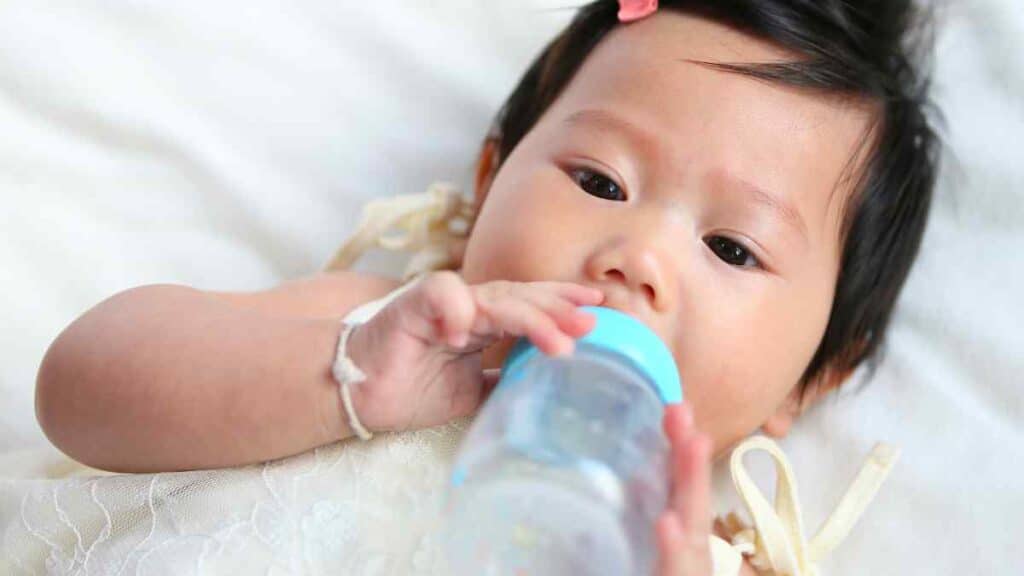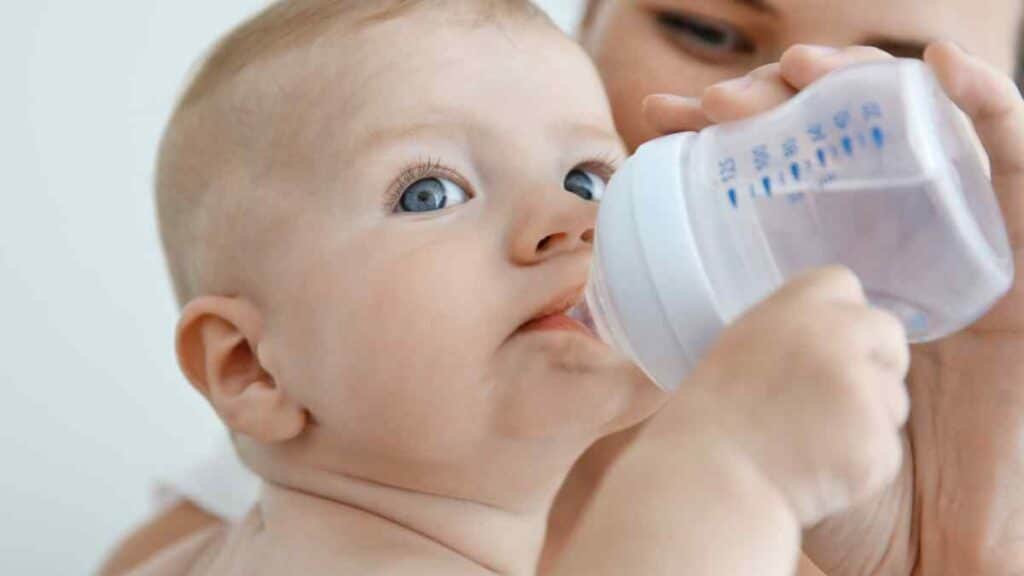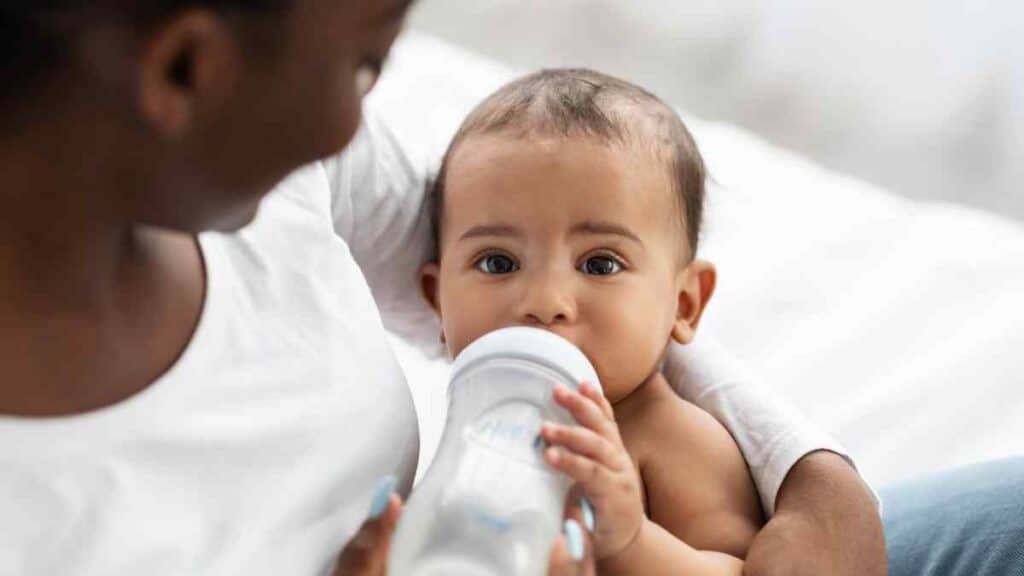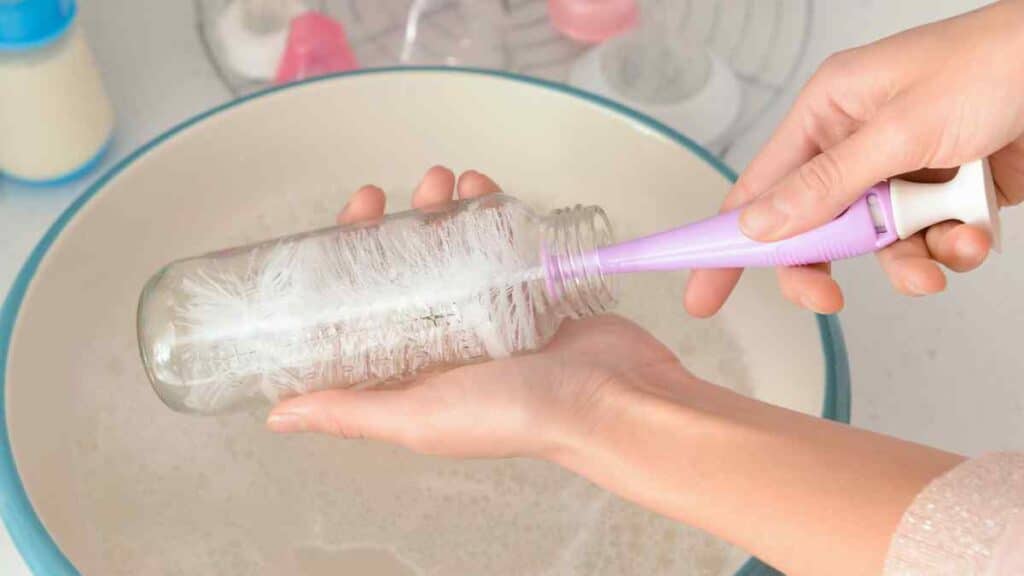Choosing the proper nutrition for your baby is one of your most significant responsibilities as a parent. While much attention is paid to the importance of breast milk or the right formula, water—a vital component in your baby’s diet—often doesn’t get the same spotlight.
From aiding digestion to maintaining overall health, the importance of water cannot be overstated. However, with so many types of water available—tap, filtered, bottled, boiled, or nursery—how do you determine the best for your little one’s feeding needs?
In this comprehensive article, we delve deep into understanding the critical role water plays in infant health and explore various types of water and their suitability for your baby. We will also discuss guidelines for using water in formula preparation when it’s appropriate to start giving your baby water, and address some of your frequently asked questions.
Our goal is to equip you with the information you need to decide on the best water for your baby’s feeding needs. Whether you’re a first-time parent or a seasoned caregiver looking for updated information, this article promises to be a valuable resource.

Understanding the Role of Water in Baby’s Health
Water is essential in maintaining the balance of bodily functions for everyone, including infants. But it is not just about hydration; the type of water used in preparing your baby’s formula plays a significant role in ensuring optimal health.
If you’re using a powdered formula to feed your baby, the water you use becomes even more critical. Mixing infant formula with the right water can significantly impact your baby’s overall health while using an unsuitable type can pose health risks.
Tap Water
The debate on tap water versus bottled water is a common one. Most tap water is safe to use for baby formula, but it can vary widely in quality depending on your location. The main concern with tap water is the potential for high levels of fluoride, which can lead to dental fluorosis. The Centers for Disease Control and Prevention (CDC) recommends using low-fluoride bottled water for mixing infant formula to avoid exposing babies to too much fluoride.
Bottled Water
Bottled water may be a safer choice for preparing baby formula, but not all bottled water is created equal. For instance, purified water undergoes a process to remove chemicals and pathogens. This process can make it safe for babies to drink, but it’s not typically necessary unless your local water supply is questionable.
Purified Water
One common question parents ask is: “Can babies drink purified water?” The answer is yes, but it’s important to understand that purified water and distilled water are not the same, even though they may seem interchangeable. While both types of water undergo processes to remove impurities, distilled water also has most of its minerals removed. Distilled water can be used in baby formula, but it’s not necessary unless recommended by your pediatrician.
Distilled Water
Some parents might wonder about the need for distilled water for babies. Distilled water is typically used in specific situations, such as when a baby has a weak immune system or when the local water supply is not safe. For general use, especially in the preparation of baby formula, low-fluoride bottled water or purified water can be more appropriate.
Nursery Water
Another type of water you may come across when mixing your baby’s powdered formula is nursery water, which is often marketed as being specifically designed for infants. Nursery water is available both with and without added fluoride. If you choose to use nursery water, opt for fluoride-free versions to avoid the risk of dental fluorosis.
Remember, it’s always essential to consult your pediatrician before making any significant changes to your baby’s diet. The same applies to nasal irrigation practices for babies; always seek professional medical advice to ensure safety.
Fluoride and Baby Formula
Fluoride is a naturally occurring mineral found in varying levels in water sources. It is also commonly added to drinking water supplies to help improve dental health. However, when it comes to mixing baby formula, it’s essential to be mindful of the fluoride content in the water, as excessive exposure can lead to dental fluorosis – a condition causing faint white lines or streaks on the baby’s developing teeth.
To ensure you’re using an appropriate water source for mixing baby formula, consider the following guidelines:
- Bottled water: Bottled water is a convenient option for parents, especially when they are unsure about their tap water’s fluoride content. Look for bottled water with low fluoride levels or those specifically labeled as “baby water” or “nursery water” to ensure your baby isn’t exposed to excessive fluoride.
- Boil tap water: Boiling tap water can help reduce the concentration of certain contaminants, but it will not remove fluoride. If your local water company supplies fluoridated water, you may want to consider using an alternative water source for mixing baby formula, such as low-fluoride bottled water.
- Water testing: If you’re unsure about the fluoride levels in your tap water, contact your local water company or have your water tested by a certified laboratory. This information can help you make an informed decision about the best water source for preparing your baby’s formula.
- Formula feeding: The American Academy of Pediatrics (AAP) recommends breastfeeding as the primary source of nutrition for infants. However, if formula feeding is necessary, it’s crucial to follow the manufacturer’s instructions for mixing and use water with appropriate fluoride levels.
- Consult a dentist: If you’re concerned about your baby’s fluoride exposure or the potential impact on their developing teeth, consult a pediatric dentist for guidance. Remember, only a dentist can diagnose dental fluorosis and provide tailored recommendations for your baby’s specific needs.
When preparing baby formula, it’s essential to follow the manufacturer’s instructions and ensure the water used is at body temperature. This not only guarantees the formula’s proper consistency but also ensures that your baby is consuming a safe and nutritious meal.

Guidelines for Water Use in Formula Preparation
Every parent wants the best for their child, especially when it comes to nourishment. When breastfeeding is not an option or is supplemented, a prepared formula comes to the rescue. The type of water used in the preparation of baby formula plays a significant role in your baby’s nutrition and overall health.
Both the World Health Organization (WHO) and the Centers for Disease Control and Prevention (CDC) provide guidelines to prepare infant formula safely. Their recommendations focus on the type of water used and the safety procedures for preparation and storage.
Choosing the Right Water
For the preparation of your baby’s formula, using bottled water, distilled, or purified water is typically safe. The ‘best water for baby formula’ is the one that ensures minimal exposure to potential contaminants, including excessive fluoride.
Tap water can be used, but it’s crucial to have your water tested to know if it’s safe for your baby. Your local health department can assist with testing tap water. If your tap water is heavily fluoridated, you might want to consider using low-fluoride bottled water or purified water. Fluoride supplements should only be used upon a doctor’s recommendation.
Boiling Water
The WHO and CDC recommend boiling water before mixing it with formula powder, even if you are using bottled, purified, or distilled water. Boiling water kills potential pathogens that could be harmful to your baby. Be sure to cool the water to body temperature or slightly warm before adding it to the formula powder to avoid damaging some of the nutritional components of the formula.
Mixing and Storing Formula
When you mix your baby’s formula, ensure to follow the instructions on the formula container precisely. Adding too much or too little water can cause health problems. For instance, too little water can lead to dehydration, while too much water can lead to poor weight gain.
Once the infant formula is prepared, it needs to be used within 2 hours if kept at room temperature, or within 24 hours if stored in the refrigerator. Do not freeze the formula, and discard any formula that your baby doesn’t finish during a feeding.
Distilled vs. Purified Water
Can babies have distilled water for baby formula? Is purified water the same as distilled water? These are common questions parents often have. The answer is yes, babies can have both distilled and purified water, but their use depends on the specific circumstances. Distilled water has most of its minerals removed, while purified water has been filtered or processed to remove impurities. Either can be used in formula feeding, but boiling is still recommended for additional safety when used to mix infant formula.

When to Start Giving Babies Water
The American Academy of Pediatrics (AAP) and the Centers for Disease Control and Prevention (CDC) provide valuable guidelines on when babies should start drinking water, and how to safely prepare it.
The primary source of hydration for babies under six months is through breast milk or formula. Giving water to babies younger than six months is usually unnecessary, and, in some cases, can even be harmful, leading to water intoxication. This happens when too much water dilutes a baby’s electrolytes, affecting brain function and leading to serious complications.
Once your baby is about six months old, you can start introducing a few sips of water into their diet. This is usually when complementary foods are introduced, and a little bit of water can assist in digestion.
When preparing infant formula, always follow the instructions provided on the packaging to ensure proper hydration and nutrition. For powdered or concentrated liquid formulas, you need to mix the formula with a specific amount of water. If your baby is under three months, was born prematurely, or has a weakened immune system, the CDC recommends boiling the water you use for formula preparation to kill any potential bacteria.
The type of water used in preparing formula can significantly affect your baby’s developing teeth. The AAP and CDC state that both bottled and tap water can be used to prepare formula, but the fluoride content can vary. Fluoridated water can benefit your baby by preventing cavities, but too much fluoride can lead to faint white lines or streaks on the teeth, a condition known as dental fluorosis.
If you are using tap water, it’s recommended to let the cold water run for a few seconds before using it for formula preparation. Hot water is more likely to contain lead and other contaminants. Always check with your local water company or the environmental protection agency for a report on your community water fluoridation.
If you use well water to mix formula, have it tested by your local health department for safety before using it to prepare the powder formula. Always bring the water to a rolling boil for one minute, then cool it in an ice bath to reach body temperature before adding it to the formula. Boiling kills any bacteria or viruses that may be present.
Ready-to-feed formulas do not require any added water. They can be served as is, ensuring the correct concentration of nutrients.

When to Boil Water
Preparing baby formula may seem like a simple task, but it’s essential to follow specific guidelines to ensure your baby’s safety and health. One crucial aspect of this process is knowing when to boil water, as it can significantly impact the quality and safety of the prepared formula. Let’s explore when and why it’s necessary to boil water for baby formula and discuss the different types of water suitable for preparing infant formula.

Instances When You Need to Boil Water
Boiling water is a crucial step in the process of preparing infant formula. The primary purpose is to kill any harmful bacteria or contaminants that may be present in tap water or other water sources. The Centers for Disease Control (CDC) recommends bringing the water to a rolling boil for at least one minute and then allowing it to cool to room temperature before using it to mix the formula.
It’s essential to boil water in the following situations:
- Boiling tap water is necessary if you plan to use it for mixing baby formula. While most tap water is treated and safe for consumption, boiling further ensures that it’s free from any potentially harmful contaminants.
- Although nursery water is marketed as safe for babies same as purified water for babies, it is still advised to boil it before use. This extra precaution helps to guarantee the elimination of any bacteria or impurities that may have been introduced during bottling or storage.
- Distilled water undergoes a purification process that removes most impurities, but it’s still a good idea to boil it before mixing it with powder formula. This step helps ensure the highest level of safety and quality for your baby’s formula.
- If you’re unsure about the quality of the water source or if it’s not adequately treated, always boil the water before using it to prepare infant formula.
However, it’s important to note that boiling water will not remove fluoride from fluoridated water sources. If you are concerned about how much fluoride is in your tap water, consider using bottled water with low fluoride levels or consulting your local water provider for information.
Conclusion
In conclusion, providing the right water for your baby’s feeding needs is a critical aspect of infant care. The type of water you choose, be it tap, filtered, bottled, boiled, or nursery water, should align with ensuring optimal nutrition and the overall well-being of your child.
The first six months of your baby’s life are particularly crucial, with breast milk or formula providing all the necessary hydration and nutrition. However, once you begin preparing formula or introducing water at around six months, understanding the differences between the types of water and their safe preparation is paramount.
We hope that this article has shed some light on the best water options for your baby’s feeding needs. However, each baby’s requirements can vary, so always consult with a healthcare provider or pediatrician for personalized advice. As a parent, understanding these guidelines and making informed choices can significantly contribute to your little one’s healthy growth and development.
If you have any questions about this article, feel free to ask them in the comments below.



